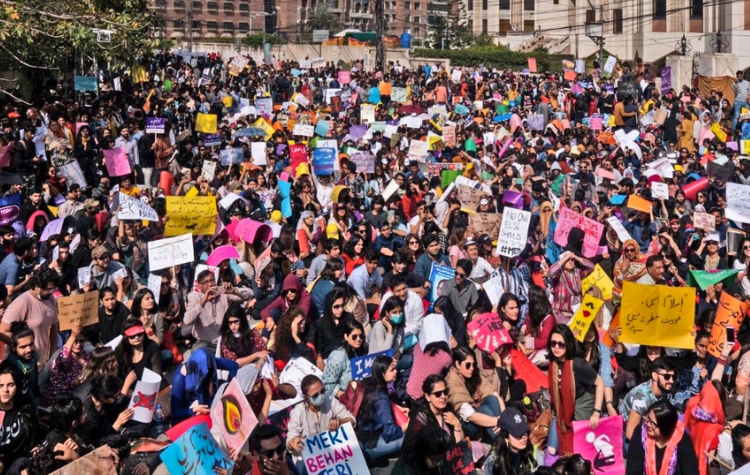(Bangkok/Kathmandu – 16 March 2023) – The Asian Forum for Human Rights and Development (FORUM-ASIA) and seven of its member organisations condemn police violence against peaceful Aurat March protesters in Pakistan on International Women’s Day.
Since 2018, the Aurat March has been organized annually by feminist organisations to bring to attention the socio-political problems and violence faced by women and gender minorities as a result of the country’s patriarchal practices. The Aurat March has continuously faced significant backlash from both State and non-State actors.
“Over the years, Aurat March has become a vital platform for gender rights activism in Pakistan. It has brought attention to the systemic patriarchal discrimination and violence that women and gender minorities in Pakistan continue to face daily. It is a powerful call for equality and justice. We unequivocally support Aurat March’s commitment towards a gender-just Pakistan. We condemn the use of force against peaceful protesters,” said the rights groups.
This year, the Aurat March faced immense challenges. In Lahore, the district administration did not permit organisers to hold the event citing Section 144 of the Code of Criminal Procedure. Section 144 is a colonial-era law used to crush dissent that prohibits all sorts of assemblies, including sit-ins, rallies, processions, demonstrations, and protests.
Meanwhile, in Islamabad, the police baton-charged participants. Protesters were also confronted with barbed wires and containers on their march route, alongside a heavy police deployment. Triggered by the ongoing transphobia in the country, as evident in the efforts to undo the Transgender Persons (Protection of Rights) Act 2018, police and media personnel questioned transgender people joining the protest. Subsequently, the police also resorted to using lathi (baton), injuring several organisers and participants. Staffers from FORUM-ASIA’s member organization, Forum for Dignity Initiatives, were also injured during the lathi charge.
The Aurat March has been at the receiving end of violence and intense opposition from conservative political parties since its inception. In 2020, petitions to ban the Aurat March were filed before the Lahore High Court. Although the courts ruled such a ban to be unconstitutional, many political groups called the March ‘vulgar’ and threatened protesters. In 2021, protesters from Peshawar were charged with blasphemy for allegedly carrying ‘un-Islamic and obscene’ placards. They also received threats from the extremist group Tehreek-e-Taliban. In 2022, amidst calls to ban the Aurat March, protesters encouraged Pakistan to reimagine legal, economic, and environmental justice, advocating for its alignment with the vision of a feminist future.
We remind the government of Pakistan of its obligations—under Article 16 of the Constitution of Pakistan and as a state party to the International Covenant of Civil and Political Rights—to uphold people’s right to peaceful protest and assembly. The ability to protest freely intersects with the right to be free from discrimination, including gender discrimination. Pakistan must work towards providing a conducive environment for its citizenry, especially women and gender minorities, for exercising their fundamental freedoms.
Signatories:
- Asian Forum for Human Rights and Development
- AwazCDS Pakistan
- Defence of Human Rights
- Bytes for All
- The Awakening
- National Commission for Justice and Peace (NCJP)
- Forum for Dignity Initiatives
- AWAM Pakistan
For further information, please contact:
- South Asia Programme, FORUM-ASIA, [email protected]
For media inquiries, please contact:
- Communication and Media Programme, FORUM-ASIA, [email protected]
**
For the PDF version of this statement, click here



